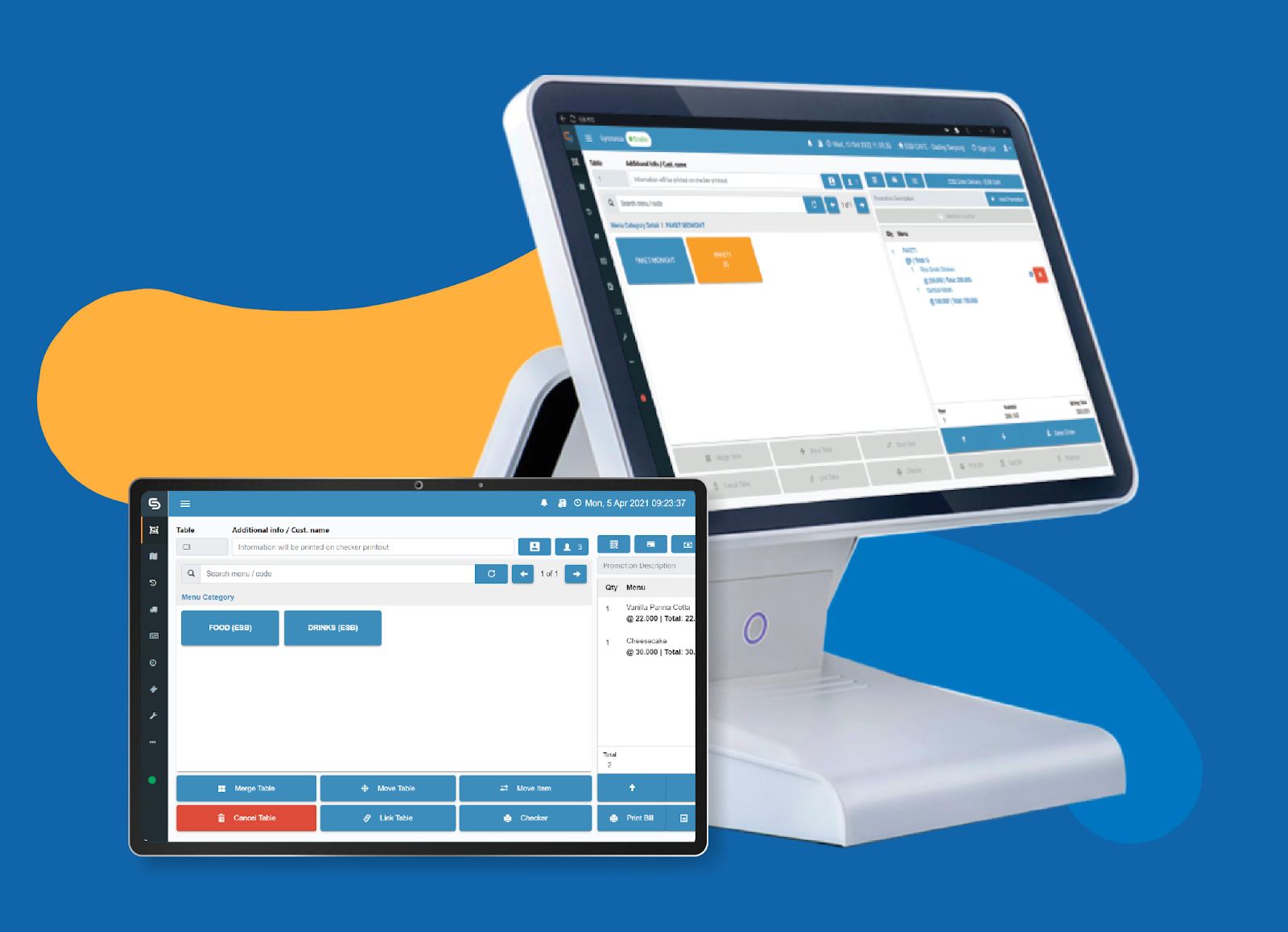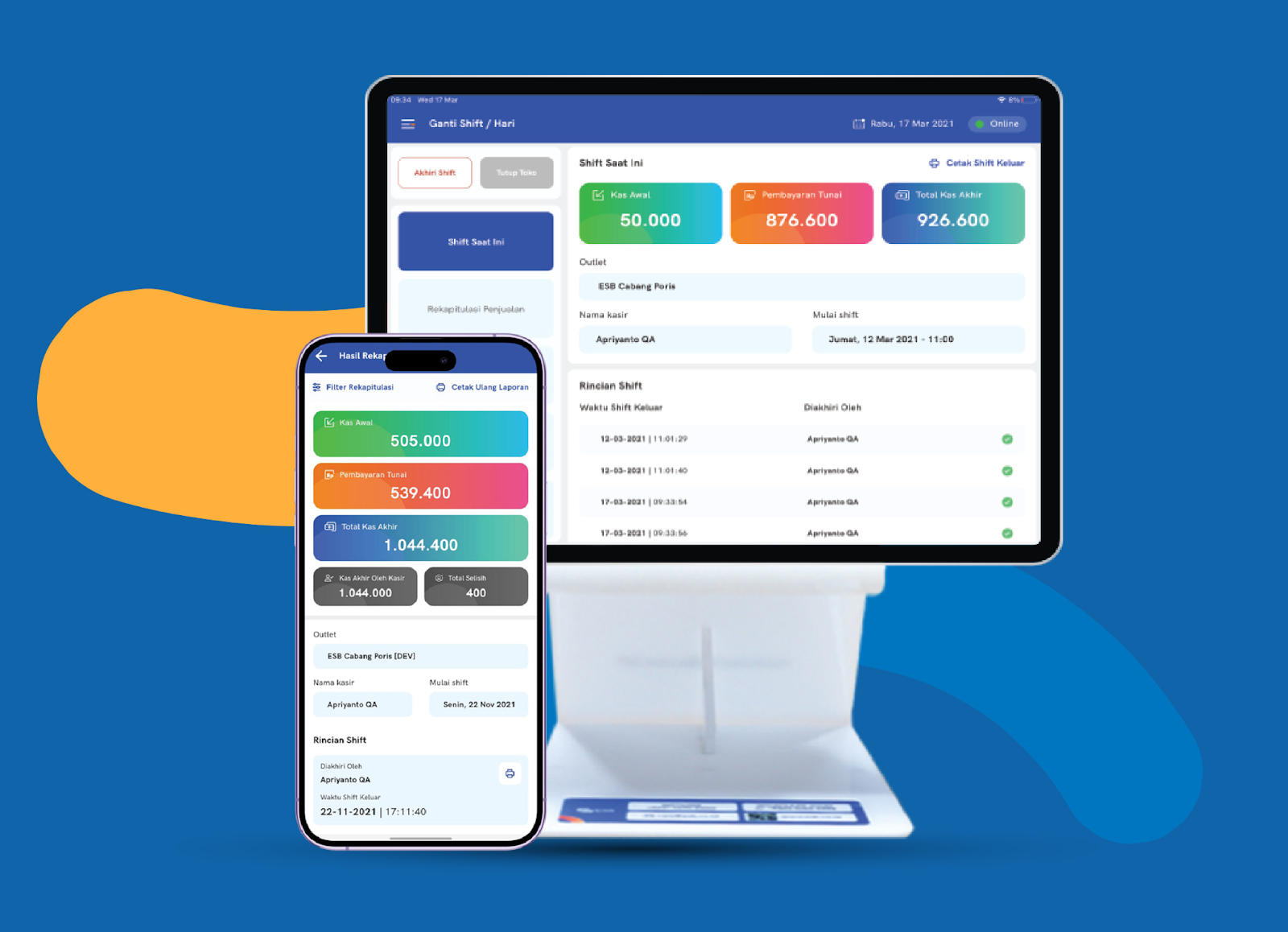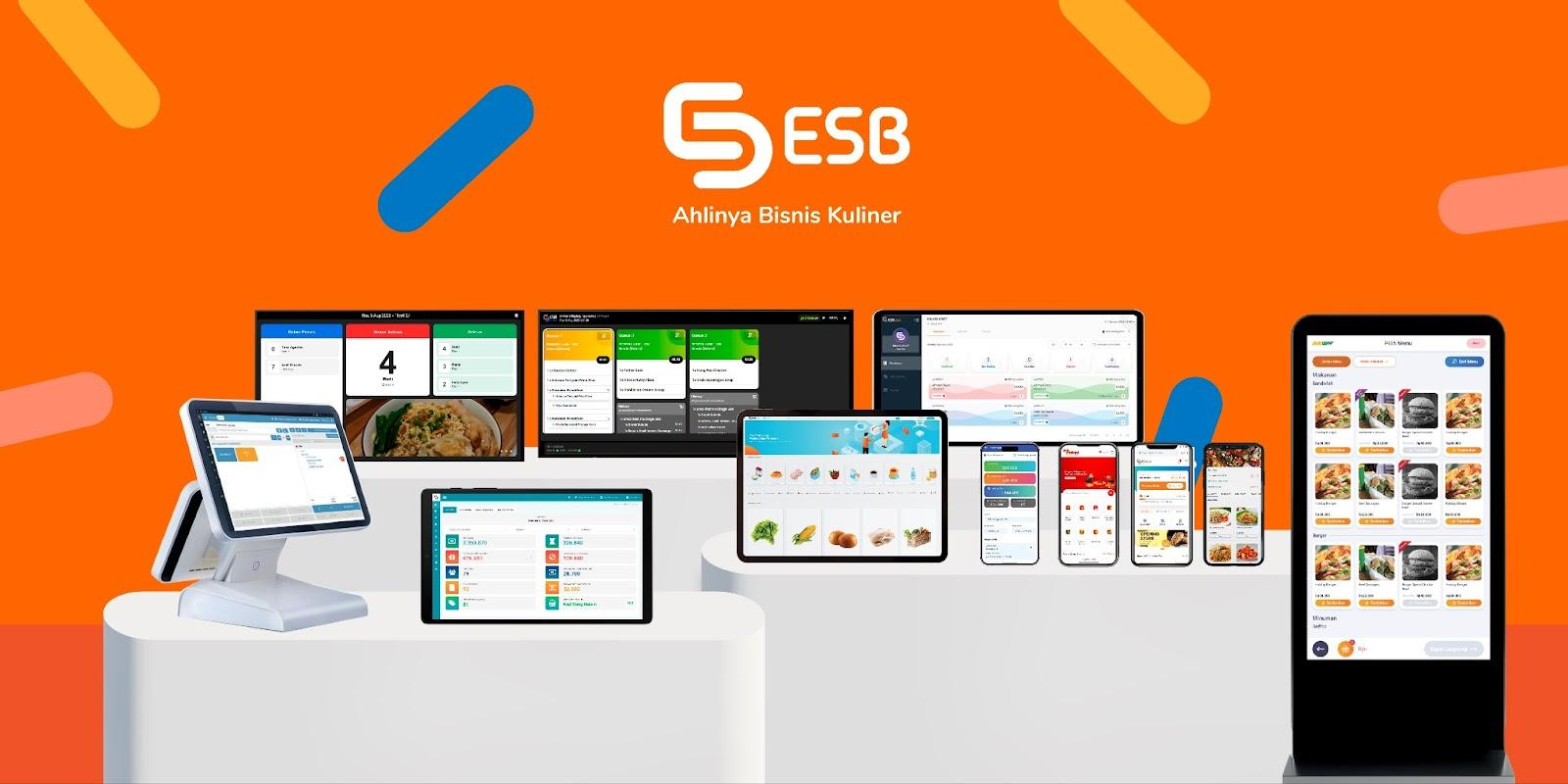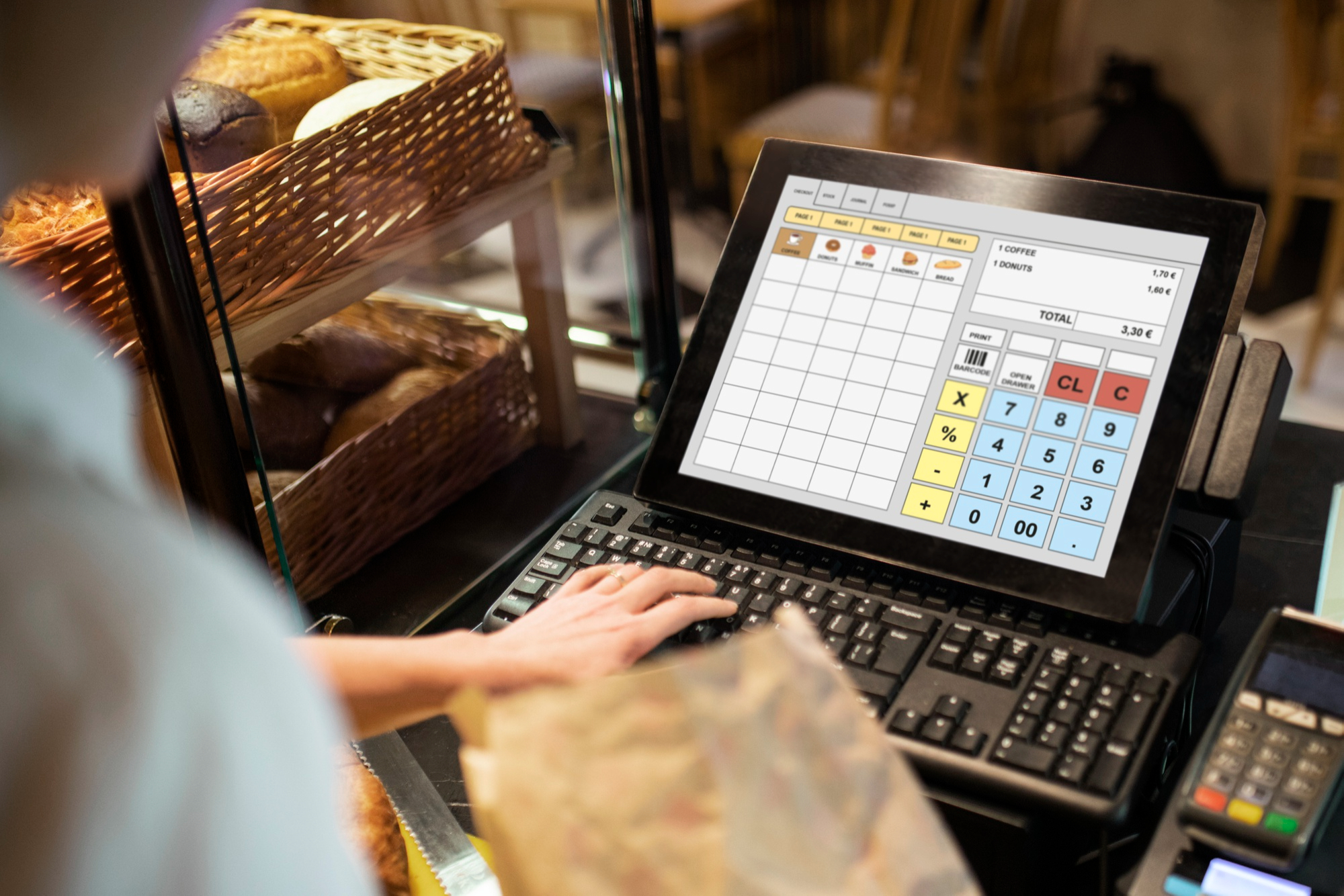 SHARE
SHARE
Integrated POS Cashier for Various F&B Business Ecosystems
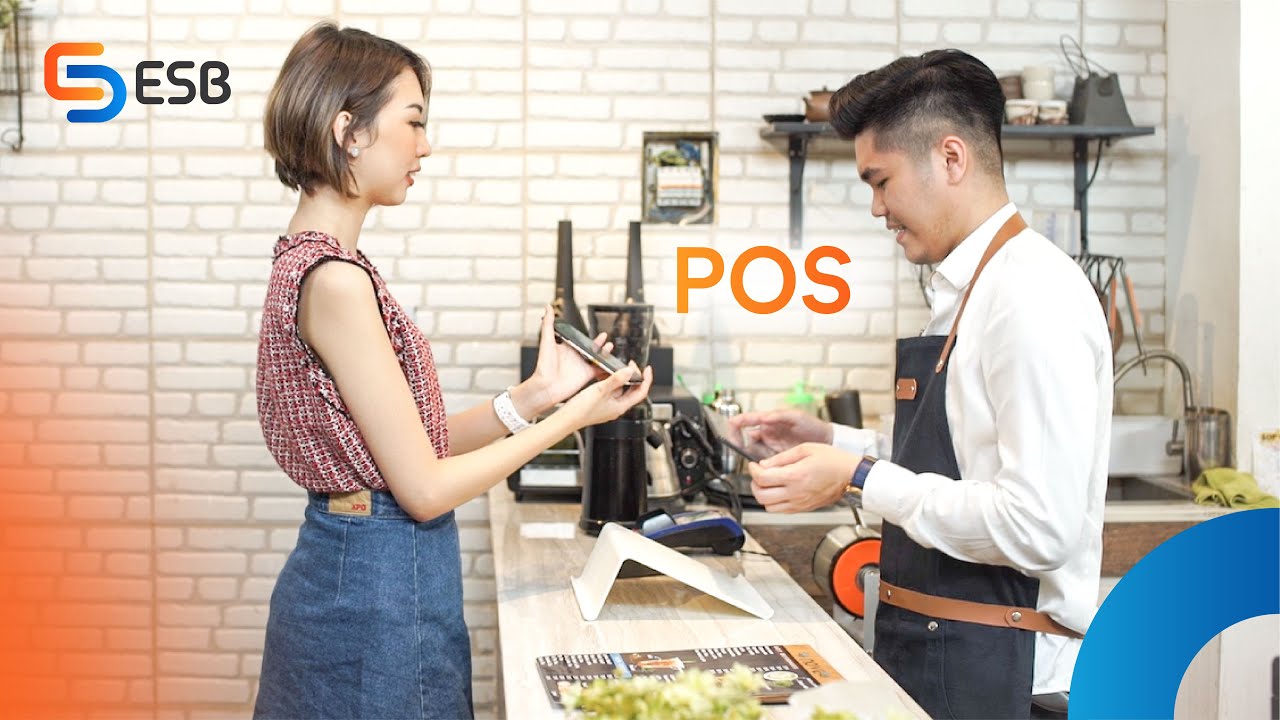
The Point of Sale (POS) application, also known as a cashier POS, serves the primary function of processing purchase or sales transactions in stores, restaurants, or other retail locations. This includes price calculation, total purchase calculation, and printing transaction receipts such as receipts or invoices, typically done by a cashier.
It is estimated that there are more than 50 brands offering POS cashier services for businesses in Indonesia. Out of these, around 80% are local POS cashier brands, while the remaining are international brands.
These POS systems are utilized by businesses from various industries, including culinary, retail, healthcare, entertainment, services, and more. Among these categories, 40% are culinary businesses, making them the main consumers of POS cashier services.
ESB POS Cashier
As one of the growing POS cashier service providers in Indonesia, ESB plays a role in assisting culinary entrepreneurs like you to develop F&B businesses through integrated POS cashier products. These products go beyond basic POS systems and are equipped with additional supporting features.
Source: esb.id
ESB offers two types of integrated POS cashiers: ESB POS and ESB POSLite. But what are the differences? Both POS cashiers serve the same primary function as POS applications but have slightly different features tailored to different F&B ecosystems. Let's discuss them one by one.
ESB POS is a full-featured POS cashier designed for various F&B business ecosystems, including restaurant and hotel ecosystems. In terms of features, ESB POS offers more comprehensive features compared to ESB POSLite.
This is because ESB POS is designed to manage daily transactions for large-scale culinary businesses, especially those with multiple outlets. Therefore, ESB POS is integrated with ESB CORE, which is a Rp20 billion ERP resource planning system.
Source: esb.id
On the other hand, ESB POSLite is a lighter version of POS cashier. It is intended for small and medium-sized culinary businesses or food courts. With a cost-efficient price, you can already get various complete features, including inventory management.
Both ESB POS and ESB POSLite are integrated with ESB Order, an online ordering system that allows your customers to order without queuing, from anywhere and anytime. ESB Order has been proven to increase restaurant revenue by up to 30%.
Integrated POS Cashier Systems
Source: ESB
Integrated POS cashier systems like ESB POS and ESB POSLite can greatly help in automating sales processes in outlets in the most efficient way possible.
ESB POS and ESB POSLite payment systems are connected to various third-party applications such as QRIS payment, OVO, Dana, LinkAJA, Gopay, TADA, QoQi, and multi-bank ECR, providing customers with a wide range of payment options.
In addition, there are several important benefits to consider why you should choose integrated POS cashiers over other POS systems. It may be cheaper in terms of price, but non-integrated POS systems can be risky for your business. Here's an explanation!
5 Benefits of Integrated POS Cashiers
Source: Freepik.com / tzido
The use of integrated POS cashiers can provide significant benefits for your culinary business. Here are some of them:
1. Operational Efficiency and Comprehensive Reporting
Integrated POS cashiers can combine various important functions such as sales recording, inventory management, financial reporting, and customer loyalty programs. This eliminates the need to manually enter data into different systems, saving time and effort, and reducing the risk of data entry errors.
Integration between POS systems and ERPs allows for more comprehensive reporting and deeper data analysis. You can easily monitor sales performance, profitability, and market trends to make better decisions.
2. Data Accuracy and Security
Integrated POS cashiers simplify the data entry process, reducing the risk of human error and increasing data accuracy. Furthermore, by integrating POS cashiers and ERPs, data security levels are improved compared to non-integrated systems. This allows for safer and centralized data management, reducing the risk of data leaks or misuse.
3. Better Inventory Management
Another advantage of integrating POS cashiers and ERP systems is that businesses can manage inventory more effectively. The system can provide real-time information on inventory levels, alerting when stocks are low, and optimizing purchases to avoid shortages or excess inventory.
4. Improved Customer Service
With an integrated system, customer data such as purchase history and preferences can be easily accessed. This allows businesses to provide more personalized service and increase customer satisfaction through loyalty programs like ESB Loop.
5. Flexibility and Scalability
Integrated POS systems are often customizable to accommodate changing business needs and can be easily upgraded as the business grows.
Integrated POS systems are designed to scale your business. As your business grows, you can easily add new features and functions to the system without replacing the entire system.
4 Risks of Not Using Integrated POS Cashiers
Source: Freepik.com / pressfoto
Here are some risks that may occur if you do not use integrated POS cashiers.
1. Data Duplication and Errors
Without integrated POS cashiers, you have to manually enter data into other platforms. This leads to data duplication, increased human error risk, inconsistent and inaccurate information, and data errors, such as unrecorded sales, incorrect inventory, and inaccurate financial reports.
2. Operational Inefficiencies and Delayed Decision Making
Manual processes in data transfer and processing can lead to errors, delays, and inefficiencies in business operations. This disrupts workflows and slows down business processes overall.
One example is the inability to analyze data comprehensively. When data is not integrated, the information needed to make decisions is not available in real-time or complete. Thus, it is difficult to immediately respond to market changes or make decisions.
3. Vulnerability to Fraud and Data Loss
Without integration, POS cashier data may be scattered across various unconnected platforms, increasing the risk of losing important data. Tracking it down will be difficult and hinder data analysis processes. This leads to missed business opportunities and increases the risk of fraud in your restaurant.
4. Difficulty in Inventory Management
Without integration with inventory systems (ERPs), it is difficult to monitor and manage inventory effectively. This results in misinformation about inventory levels, disrupting business operations and hindering your restaurant's profit.
As a culinary entrepreneur, you must identify the business and programs needed to use POS cashiers effectively according to your business needs. Choosing the right POS cashier will facilitate you in managing restaurant operations effectively and efficiently. You can also prevent various risks mentioned above.
Integrated systems will minimize common mistakes. By utilizing POS cashiers like ESB POS and ESB POSLite, your culinary business will benefit. It can also improve customer convenience when transacting at your restaurant.
In 5 years, ESB has been trusted by more than 20 thousand outlets in Indonesia and Southeast Asia. By using ESB POS cashier, you can focus on more essential things. Thus, the development of your business can be realized optimally. Let's use integrated POS cashiers for the advancement of your culinary business!
 SHARE
SHARE
